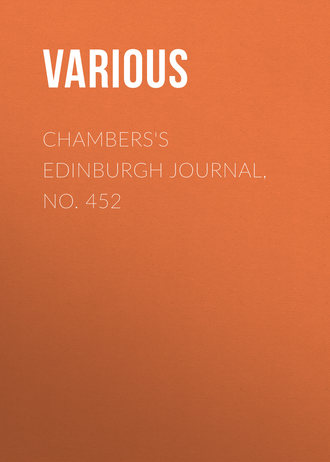
Various
Chambers's Edinburgh Journal, No. 452
THE SHIP'S FIRST VOYAGE
BY MRS ALARIC WATTS
That ship was nought to me, nor I to her,
But I pursued her with a lover's look.
Wordsworth.
A stranger in a foreign land,
Soft music met mine ear—
O Richard, O mon roi, struck up
In flute-notes wild and clear:
And scarce had died that plaintive strain,
When lo! how could it be?
Thy thunder pealed above the tide,
'Britannia rules the sea!'
I knew not whence the magic came,
But sought the distant shore,
And there a stately pageant lay
Unseen, undreamt before:
A gallant vessel newly dressed
With flags and streamers gay,
An untried wanderer on the wing,
To cleave an untried way.
And joy was with the multitude,
And gladness on the earth,
The tongue of every living thing
Rang with a sound of mirth.
All that stern Wisdom could desire,
Or Fancy fair engage—
Danger-defying youth was there,
And calm experienced age.
It seemed as though earth's very best
To that brave barque were given—
Science for nature's mysteries,
And childlike faith for Heaven.
How strangely is sensation formed,
How mingled hope and fear,
Since Mirth herself can oft repel
And Sadness' self endear!
Whence is it that a sigh can soothe,
And sweetest sounds may jar?
Those wingèd words my thoughts had sent
A thousand leagues afar.
I listened to the thrilling strain,
Unbidden tears would start,
The sound fell lightly on the ear,
But heavy on the heart.
The low breath of the summer wind
Seemed but the siren's voice,
In vain I chid my coward fears,
And struggled to rejoice!
Her gallant hearts were numbered,
Her snowy wings were set,
Her pilot's hand was on the helm,
But there she lingered yet.
The ringing laugh suspended,
The voice of mirth was hushed,
When the twilight's holy anthem
In a burst of music gushed.
Warm hearts of many nations
Were blended in that prayer,
And the incense that went up to heaven,
Was surely welcomed there.
Like rain upon the thirsting earth
Was that sweet chant to me,
Like a cool breeze in a desert—
Like a gale from Araby.
And the mental clouds, late veiling
The charm of sea and shore,
Rolled off like mist before the sun,
And I was sad no more.
Slow sailed the stately vessel,
And slowly died the strain;
But I knew that God was with it,
THE HARE AND THE LION: AN INDIAN POLITICAL LIBEL
Who knows not this story? Nevertheless we publish it; for even as the hare conquered the lion, so does the Bengalee overcome the Englishman:—A hare sat in the jungle with his wife, and he said: 'There is our king, the lion, come into the wood, and he will devour our children.' 'No,' said the little hare, 'for I will go to confront him, and conquer the great lion, the king of the beasts.' Then her husband laughed, and said: 'Intellect is power; we can die but once; let us see what you can do.' Then the little hare, taking her little son in her paws, jumped and jumped till she came to the lion. Then she put down her son before his face, and put her two paws together in all humility, and said: 'Lo! king of kings, I have brought you a nuzzurana; oblige me by eating it. Also, I have some news to give you.' Then the lion looked at the hare's baba, and saw it was soft and juicy, and was pleased in his soul, and laughed, and his laugh was as the roar of the thunder of Indro. Then he asked her news, and the little hare replied: 'You are the sovereign of the forest, but another has come who calls himself king of the beasts, and demands tribute.' Then the roar of the lion shook the forest, and the little hare nearly died with fear as he asked: 'Where is the scoundrel? Can you shew him to me?' Then the little hare leaped along with the lion till she came to an old well. The well was nearly full, but had no wall. And she said: 'Look, he is hiding there in fear.' Then the lion, craning his neck, looked and saw his own shadow, and with a fearful roar, leaped into the well. So the little hare, with a glad heart, took up her son, and went to her husband, and said: 'Lo! intellect is power: I have killed the lion, the king of the beasts.'—From the Sumochar Durpun, a Bengalee newspaper, of the 2d August 1851.
Just Published,
Price 2s. 6d. sewed, 3s. Cloth, lettered,
LIFE AND WORKS OF BURNS.—Volume IV. Edited by Robert Chambers. This work is now completed.
Price 6d. Paper Cover,
CHAMBERS'S POCKET MISCELLANY: forming a Literary Companion for the Railway, the Fireside, or the Bush.


